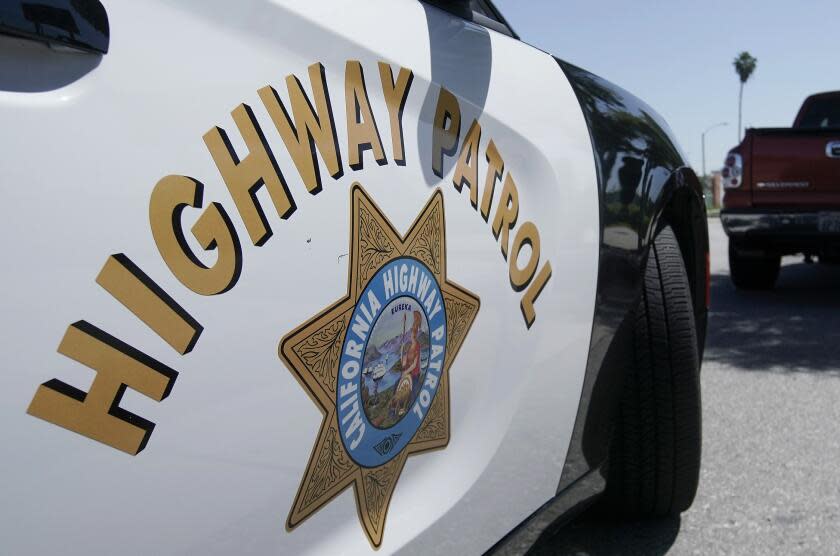Newsom says CHP work in cities has led to 'unprecedented' fentanyl seizures

Appearing at a memorial service for fallen officers, Gov. Gavin Newsom this week praised the "unprecedented" work done by the California Highway Patrol after he dispatched officers across the state to help combat organized retail theft rings and fentanyl trafficking.
The Newsom administration, facing increased political pressure, turned to the CHP to address rising concerns about crime. When contentious, sometimes violent student protests erupted on college campuses over the war in Gaza, the governor made CHP officers available to help when requested by local agencies.
"You've been asked proactively to go out recently ... throughout California," Newsom said Tuesday during a CHP memorial service in Sacramento. "We are making unprecedented seizures around fentanyl. The work you're doing around retail theft ... you've never been asked to do more."
Read more:UCLA struggles to recover after 200 arrested, pro-Palestinian camp torn down
Experts say this isn't the first time a governor has deployed state officers to local cities and is keeping up with the mission of the state police to serve as part of the state's mutual-aid system, where state officers serve as reinforcement if local agencies are strapped. But his use of the CHP comes as California is facing national ridicule for high-profile thefts and open drug use, which may put political pressure on the governor to respond with visible actions.
Two weeks ago the governor deployed CHP officers to Bakersfield which has reportedly seen a spike in car thefts and has higher rates of violent and property crime and more arrests compared to the statewide average.
A year ago, officers were sent to San Francisco to address fentanyl trafficking after seeing a 40 percent jump in overdose deaths that year. And in February Newsom ushered in his first batch of officers in Oakland, at the request of local leaders, to bolster police after crime reports from 2023 revealed that violent crime increased by 21 percent, robbery rose by 38 percent, and vehicle theft went up by 43 percent.
Read more:55 years after Reagan took on Berkeley, Newsom stays in the background amid roiling campus protests
"This is not unusual," said Lt. Diane Goldstein, who is retired from the Redondo Beach Police Department and now a guest lecturer on criminal justice and drug policy. Goldstein says a lingering question is the impact on communities that have a sordid history with policing.
"Law enforcement is reactive and we don’t necessarily study the outcome of the use of resources," she said. "We’ve got to start doing a better job at that."
Since Newsom deployed 120 California Highway Patrol officers in Oakland and the East Bay, criminal justice advocates are paying close attention.
Jose Bernal, political director, of Ella Baker Center based in Oakland said that the city "has a long history" of CHP presence.
"This is a recycled, failed approach to addressing real concerns and issues. The way to address them is not by deploying more police in underserved communities. We are very concerned about that."
Read more:The CHP was sent into this California city to crack down on crime. Here is what happened
In Oakland and the rest of the East Bay Area, CHP officers have arrested 168 suspects linked to gangs, organized crime and carjacking rings. Another 360 stolen vehicles were recovered and 16 firearms linked to crimes were seized, according to Newsom's office.
In the year since CHP was deployed in San Francisco, there have been over 500 arrests and nearly 700 pounds of fentanyl seized. In Bakersfield, authorities have made 211 arrests and recovered 127 stolen vehicles in the first six weeks of the deployment effort.
"There’s a cultural concern about the way California is depicted," Robert Weisberg, a law professor and co-director at Stanford Criminal Justice Center said about crime rates. "It does not take any great political insight to say that Newsom wants to do very visible things. If he’s doing it for political ambition that’s fine. Especially if you exercise that ambition by doing constructive things."
Weisberg continued, "Very dramatic interventions like this in response to a crisis often work in the short term." But he cautioned that while increased arrests can be an indicator of success, "you have to worry about a bad incentive on the part of the police to encourage more arrests to promote the success of the operation."
This story originally appeared in Los Angeles Times.
